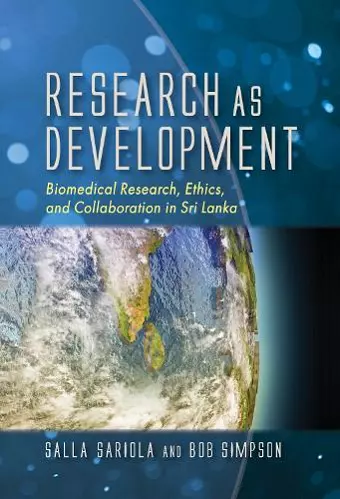Research as Development
Biomedical Research, Ethics, and Collaboration in Sri Lanka
Robert Simpson author Salla Sariola author
Format:Hardback
Publisher:Cornell University Press
Published:15th Mar '19
Should be back in stock very soon

In Research as Development, Salla Sariola and Bob Simpson show how international collaboration operates in a setting that is typically portrayed as "resource-poor" and "scientifically lagging." Based on their long-term fieldwork in Sri Lanka, Sariola and Simpson bring into clear ethnographic focus the ways international scientific collaborations feature prominently in the pursuit of global health in which research operates "as" development and not merely "for" it.
The authors follow the design, inception, and practice of two clinical trials: one a global health charity funded trial and the other a pharmaceutical industry-sponsored trial. Research as Development situates these two trials within their historical, political and cultural contexts and thus counters the idea that local actors are merely passive recipients of new technical and scientific rationalities.
While social studies of clinical trials are beginning to be an established niche in academic writing, Research as Development helps fill important gaps in the literature through its examination of clinical research situated in cultures in low-income settings. Research as Development is noteworthy for the way it highlights the critical and creative role that local researchers play in establishing international collaborations and making them work into locally viable forms. The volume shows how these clinical and research interactions bring about changes in culture, technologies and expertise in Sri Lanka, contexts that have not previously been written about in any detail.
Ethnographic inquiry reveals that international clinical research and collaboration engages many stakeholders at multiple levels of society. The implications of these multilevel research interactions are changes in culture, technological innovation, and expertise that impacts national development, particularly in health and economics. The derived ethnographic conclusions, while important, are not earth-shattering.
* Choice *In sum, this is a very inspiring book that incites us to think in novel ways about the crucial theme of ethics in global bio- and inter-medical collaboration. It will be highly relevant to scholars in both social and medical sciences and accessible to students.
* Medical Anthropology QuarterISBN: 9781501733604
Dimensions: 229mm x 152mm x 22mm
Weight: 454g
222 pages